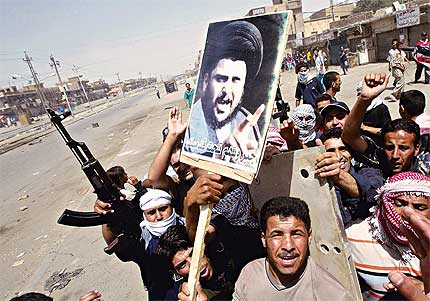Big news out of Lebanon, breaking just now, story here alJazeera English, violence is breaking out between street forces of Hezbollah and the Sunni government of Fouad Sinora. As of now, it seems, the Lebanese Army is trying to stay out of the fight. Sheik Nasrallah, head of Hezbollah, gave a speech on TV saying that a recent government initiative to prevent their telephone networks (used for surveillance??) was equivalent to a declaration of war by the pro-Sunni government factions.
More ominously this (from the al-Jazeera piece):
Fears that the political conflict in Lebanon could escalate into sectarian conflict were heightened when Mohammed Rashid Kabbani, Lebanon’s Sunni grand mufti, spoke against Hezbollah for the fist time.
“Sunni Muslims in Lebanon have had enough,” Kabbani said in a televised address from his office.
The Sunni spiritual leader referred to Hezbollah as “armed gangs of outlaws that have carried out the ugliest attacks against the citizens and their safety”.
As Seymour Hersh detailed in the New Yorker more than a year ago, the US was helping to arm/train/supply (mostly through proxies like Saudi Arabia) Sunni militias to help undermine Hezbollah (which is Shia and allied with Iran).
A great piece here from Andrew Lee Butters, Time’s Lebanon man for the Middle East Blog who lives in Beirut, detailing the creation of Awakening-like Sunni groups in neighborhoods to protect against Shia ethnic cleansing. Check back to that site as likely he will be a key blogger as this story continues.
—Iraq
Also from al-Jazeera, more gun battles/street fighting in Sadr City, the Shia stronghold of Baghdad. The US and its (more pro-Iranian) Shia allies in the (so-called) Iraqi Government (really just the Dawa and ISCI militias) are cutting off supplies to neighborhoods seen as pro-Sadr (BBC). Similar to the policy the US and Israel have been employing by cutting of the West Bank (due to its election of Hamas). The BBC article linked above details the looming humanitarian disaster in Baghdad–the entire country is a humanitarian disaster but that’s a different for another day. Football stadiums are being prepared for the exodus of civilians who are getting caught in the fight between the Mahdi Army and the US Army. Expect more disaster to follow (think New Orleans Superdome).
The worse possibility is now a coordinated multi-prong attack on all these fronts, showing up this idea the US has been pushing for, for an anti-Iranian (i.e. anti-Shia) alliance in the Middle East. Saber rattling with Iran is increasing, John Bolton is openly calling for strikes on Iran, Kuwaiti Sunni is claiming Iran is funding AQI, and the US continue to try to argue that Iran is the main backer of Sadr and attacks on the US military (as opposed to Iran actually being the main source of training/funding for the Iraqi Government which is why Mahmoud Ahmadinejad was given a hero’s welcome on his recent trip). This is all very fishy and scary frankly.
What is unclear would be if the US were to use air strikes on Iran, how would the Supreme Islamic Council Badr Corps (i.e Iraqi security forces) respond–would they turn on the American military? We know the Sadrists would rise up against the US. We also know the Iranians would unleash their own Revolutionary Guards/al-Quds elements across the border to attack. And Hezbollah would likely attack Israel unless of course they are too busy fighting Sunni in Lebanon. I guess they could leave Hamas to do the attacking of Israel.
We are not quite there yet, so I don’t want to be too alarmist, but a lot of chess pieces are moving into position.





